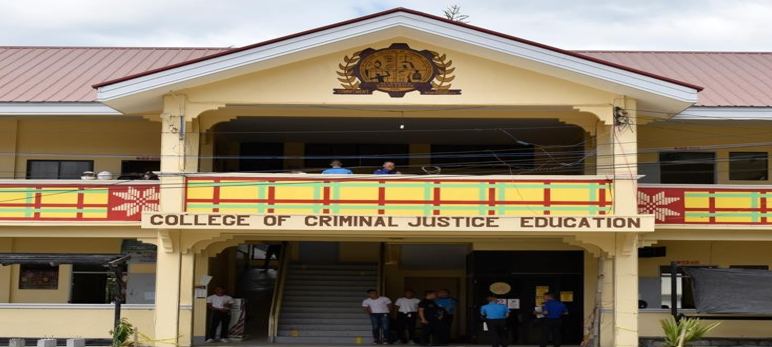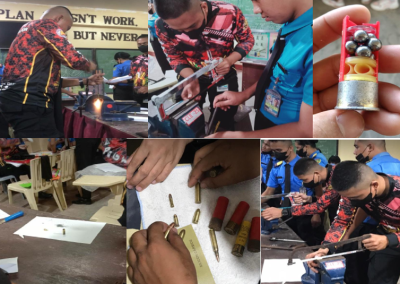
College of Criminal Justice Education
Overview
Bachelor of Science in Criminology and Bachelor of Industrial Security Education degrees are both offered by the College of Criminal Justice Education (CCJE) as four-year programs. The college prepares students to work in the three main divisions of the Department of Interior and Local Government (DILG) and  other allied law enforcement agencies namely, the Philippine National Police (PNP), the Bureau of Jail Management and Penology (BJMP), and the Bureau of Fire Protection (BFP).
other allied law enforcement agencies namely, the Philippine National Police (PNP), the Bureau of Jail Management and Penology (BJMP), and the Bureau of Fire Protection (BFP).
CCJE is dedicated to making sure that its graduates have the academic know-how, professional abilities, and service-oriented mindset required to perform as excellent public safety officers, research-oriented problem solvers, and responsible citizens.
CCJE also cultivates physically fit young citizens who dedicate themselves to careers in law enforcement and public safety. These individuals grow into competent, proficient, skilled, scientific, and technically well-trained vanguards of society, equipped with knowledge and training in contemporary law enforcement work, scientific crime detection and investigation, corrections, and social defense, as well as a strong belief in God.
Vision:
The College of Criminal Justice Education envisions itself as a dynamic and significant organization that offers relevant and responsive education in the rapidly evolving fields in criminal justice and public safety.
Mission:
Graduates from the College of Criminal Justice Education must be capable to provide the community with professionally competent and morally upright graduates who can deliver efficient and effective services in crime prevention, crime detection and investigation, law enforcement, public safety, custody and rehabilitation of offenders, criminological research among others.
Objectives:
• To prepare students for the challenging careers in law enforcement, correctional management, public safety and crime prevention and detection.
• To provide avenues for research and contribute to the understanding of the nature and causes of crime and criminal behavior.
• To provide the community access to criminal justice education graduates who are morally and professionally competent and can provide effective and efficient services in the fields of public security, criminology and criminal justice.
Program Outcomes Common to the Criminal Justice Education discipline
• Conduct criminological research and further studies;
• Ensure public safety and order maintenance;
• Prevent, suppress and control crime;
• Investigate and detect crime;
• Enforce laws, rules and regulations;
• Protect lives and properties;
• Acquire knowledge in Criminal Law, Jurisprudence and Procedure.
BACHELOR OF SCIENCE IN CRIMINOLOGY
ADMISSION POLICIES
These admission policies shall apply to all incoming freshmen, shifters and transferees effective Academic Year 2022-2023 and onwards.
STUDENT RATIO
a. Strict implementation of one-instructor-to-forty-student ratio 1:40 (CMO. No. 05, Sec. 15.5, Series 2018);
b. A maximum limit of 240 students to be admitted per Academic Year enrolment;
FOR FRESHMEN
Applicants for admission to the BS Criminology must have the following qualifications:
a. High school general weighted average of at least 85% or its equivalent;
b. A stanine score of 6 (or percentile rank of 30 or higher) in the OTIS-LENNON SCHOOL ABILITY TEST (OSLAT) in the University Entrance Examination;
c. Must undergo and pass the interview and evaluation by the enrolment/admission committee.
d. Must undergo and pass the agility test;
e. Must meet the medical examination required by the Health Services Unit.
f. When the student fails to meet any of the above requirements, the student will be required to take and pass the admission exam to be given by the program head and must meet the 80% passing percentage to be considered as passed.
In any case where more students are qualified and exceed in the admission quota of the program, ranking will be used to accommodate students.
If the prescribed admission quota of freshmen was not met, those most meritorious such as with scores or grades very near the prescribed cut-off maybe evaluated for consideration by the committee composed of Dean, Program Head and one faculty teaching major subject in the program.
BACHELOR OF SCIENCE IN INDUSTRIAL SECURITY MANAGEMENT
ADMISSION POLICIES
These admission policies shall apply to all incoming freshmen, shifters and transferees effective Academic Year 2022-2023 and onwards.
STUDENT RATIO
a. Strict implementation of one-instructor-to-forty-student ratio 1:40 (CMO. No. 06, Section 15.5, Series 2018);
b. A maximum limit of 240 students to be admitted per Academic Year enrolment;
FOR FRESHMEN
Applicants for admission to the BS Criminology must have the following qualifications:
a. High school general weighted average of at least 85% or its equivalent;
b. A stanine score of 6 (or percentile rank of 15 or higher) in the OTIS-LENNON SCHOOL ABILITY TEST (OSLAT) in the University Entrance Examination;
c. Must undergo and pass the interview and evaluation by the enrolment/admission committee.
d. Must undergo and pass the agility test;
e. Must meet the medical examination required by the Office of Health Services.
f. When the student fails to meet any of the above requirements, the student will be required to take and pass the admission exam to be given by the program head and must meet the 80% passing percentage to be considered as passed.
In any case where more students are qualified and exceed in the admission quota of the program, ranking will be used to accommodate students.
If the prescribed admission quota of freshmen was not met, those most meritorious such as with scores or grades very near the prescribed cut-off maybe evaluated for consideration by the committee composed of Dean, Program Head and one faculty teaching major subject in the program.
FOR SHIFTERS/TRANSFEREES
Students from other program or colleges in UA or other universities/colleges who want to transfer to the BS Criminology program may be accepted provided there is a vacant slot in the quota. They must have the following qualifications:
a. A general weighted average (GWA) of 85% or its equivalent in previous course/s taken;
b. A stanine score of 6 (or percentile rank of 30 or higher) in the OTIS-LENNON SCHOOL ABILITY TEST (OSLAT) in the University Entrance Examination;
c. Must undergo and pass the interview and evaluation by the enrolment/admission committee.
d. Must undergo and pass the agility test;
e. Must meet the medical examination required by the Health Services Unit.
f. When the student fails to meet any of the above requirements, the student will be required to take and pass the admission exam to be given by the program head and must meet the 80% passing percentage to be considered as passed.
FOR QUITTERS
Quitters must be subjected for deliberation composed of the Dean of the College, Program Head and one faculty member teaching major subject in the program.
Scholastic record of the student must meet the average of not lower than 2.5 per semester and no grade lower than 2.5 in any subject.
If the student did not meet one of the above requirements, he/she will be admitted in the program and be subjected for monitoring for one semester to identify if the student is commendable to be retained in the program.
If the student did not meet any of the above requirements, he/she will be advised to shift to another program.
RETENTION POLICY
Retention Policy shall be applicable to the Bachelor of Science in Criminology. A student shall be retained in the program when he/she has a General Weighted Average (GWA) of not lower than 2.5 in a semester, and no grade lower than 2.5 in any subject.
A review committee composed of the Dean of the College, Program Head and one faculty
member teaching major subject in the program, shall review the students’ academic files and prepare the final list of students that are to be retained each semester. Those students whose names appear in the Retention List may appeal through writing to the Dean. The Dean may opt to act on the appeal. Appeals that are not acted upon shall be considered as advises for students to shift to other non-board programs whose quota is still open.
Bachelor of Science in Criminology
Criminology is the study of crime and how the various justice systems function and respond to crime, criminals, and victims. Therefore, the goal of the CRIMINOLOGY PROGRAM is to produce graduates who are morally upright and professionally competent so that they can serve the community in a variety of capacities, including law enforcement, detention, rehabilitation, and crime prevention.
The program also aims to prepare students for careers in crime prevention, law enforcement, scientific crime detection, and correctional administration; to promote research and inquiry on the nature, causes, treatment, or punishment of criminal behavior; and to instill the values of leadership, integrity, accountability, and responsibility while serving their fellow citizens, community, and country.
Specific to BS Criminology program
Graduates of the BS Criminology program equipped with relevant knowledge, skills, attitude and values shall be able to:
• Conduct criminological research on crimes, crime causation, victims, and offenders to include deviant behavior;
• Internalize the concept of human rights and victim welfare;
• Demonstrate competence and broad understanding in law enforcement administration, public safety and criminal justice;
• Utilize criminalistics or forensic science in the investigation and detection of crime;
• Apply the principles and jurisprudence of criminal law, evidence and criminal procedure;
• Ensure offenders’ welfare and development for their re-integration to the community.
Bachelor of Science in Industrial Security
The College of Criminal Justice Education offers the four-year Bachelor of Science in Industrial Security Management (BSISM) degree program. BSISM is a specialist bachelor degree that can lead or be employed in a wide range of businesses, but is often associated with CRIMINAL JUSTICE and HOMELAND SECURITY. It is expected to study contemporary challenges to homeland security, international security, airline security, and other related fields. Students enrolled in a security management degree program also learn how to lead and organize teams and how to cooperate in stressful situations. A quantitative aptitude and the capacity for swift decision-making are prerequisites for security management degrees.
This program involves the study and application of the principles of security. It prepares its graduates to assume supervisory roles. It involves the study of the principles and methods of risk management and the applicable interventions that confronts all types of human conditions and endeavors. It also includes the study and practice of the means of protecting resources from loss or damage.
Specific to BS Industrial Security Management
• Conduct cost-effective security survey, audit, and inspection for private and public institutions;
• Conduct risk and impact analysis and loss event profiling for enterprises and state-owned establishment;
• Develop and implement competitive intelligence, security and corporate investigation program.
• Plan and manage any form of contingencies and emergencies and contain crisis;
• Formulate and implement security management plans and programs including business continuity plan and management;
• Organize, develop and operate a security guard force and private detective agency.
The Graduates
Graduates of CCJE may find employment that involves public or private management, national or local government services, military services, law enforcement, and private security. Career path in becoming a Police Officer, Correctional or Security Management Officer, Academic Instructor, Investigator or Officer, Bank Credit Investigator, Immigration Officer, Airport Police, Sea Vessel Security Manager, etc.
Services
The College of Criminal Justice Education is a provider of wide variety of services. It helps train selected Barangays in terms of life saving, calamity response, firefighting, tanod trainings in arrest procedure and blotter, legal services, environmental protection, etc.
Faculty trained in Criminalistics Sciences can provide seminars and training in different bureaus upon request, the Crime Laboratory of the College of Criminal Justice Education can provide adequate venue to facilitate criminalistics needs.
Curricular offering with accreditation level
The College of Criminal Justice Education offers two programs, the Bachelor of Science in Criminology and Bachelor of Science in Industrial Security Management.
The BS Criminology program was accredited Level III by Accrediting Agency of Chartered Colleges and Universities in the Philippines, Inc. (AACUP); while
The BS Industrial Security Management is a newly offered program and is COPC compliant.
Scholarships and financial grants
University of Antique is committed in changing lives and building communities in which the students enjoy free tuition and benefits, scholarship grants, including varsity scholarships for deserving athletes.
The College of Criminal Justice Education can be reached through the following:
Office Address:
College of Criminal Justice Education University of Antique
Mayor Santiago A. Lotilla St., District I, Sibalom, Antique
Email: ccje@antiquespride.edu.ph
Telephone No.: 036 541 8161 Local line: 1151
CCJE Faculty
- Elden John D. Aurillo, PhD. Crim.
- Armel P. Amedo MSCrim
- Sharon P. Cordero MSCrim
- Mileouda C. Fortos MSCrim
- Jhetro Royce E. Espartero MSCrim
- Mark Anthony A. Odango MSCrim
- Mario N. Cayetano MSCrim
- Jcbelle C. Garcesa MSCrim
- Japhet V. Quiape MSCrim



